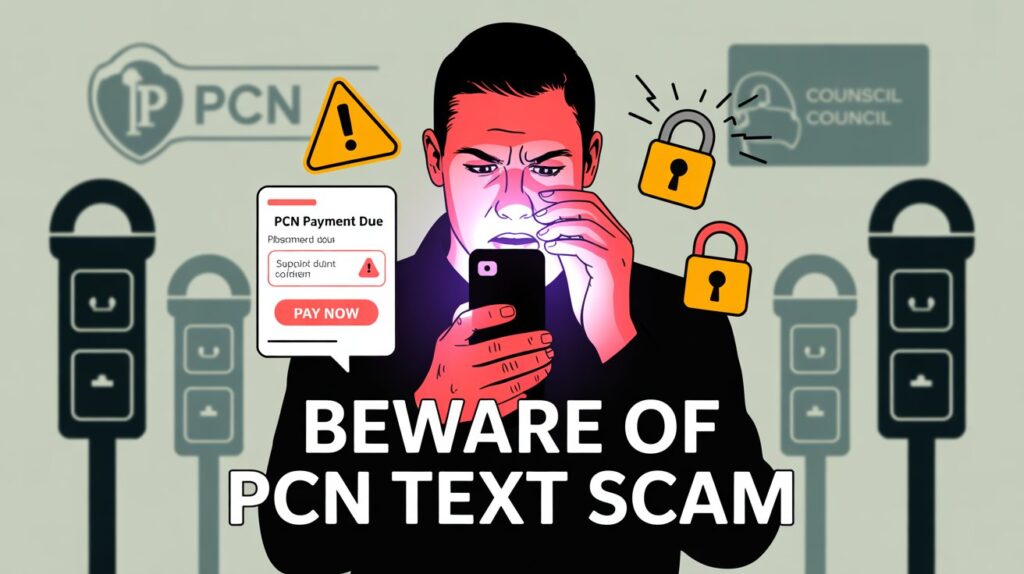Imagine this: you’re going about your day when suddenly a text message pops up on your phone. It claims you’ve received a Parking Charge Notice (PCN) and demands urgent payment to avoid further fines or legal action. Panic sets in—you start wondering where you parked, whether you overstayed, and how much it might cost you. Many people, caught off guard, immediately click the link in the text or pay without questioning it.
Welcome to the world of the PCN text scam, one of the most deceptive and fast-rising fraud tactics in the UK today. Criminals are exploiting the anxiety surrounding parking fines to trick drivers into paying money they don’t owe or into handing over sensitive financial details.
In this blog, we’ll break down how the PCN text scam works, why it’s on the rise, and—most importantly—what steps you can take to protect yourself and your loved ones.
What Is a PCN?
Before we dive into the scam itself, let’s clarify what a Parking Charge Notice (PCN) actually is.
In the UK, a PCN is a legitimate penalty issued by local councils, Transport for London (TfL), or authorised parking enforcement companies. It’s usually given when:
- You park illegally in a restricted zone
- You overstay in a paid parking area
- You enter a bus lane or commit another parking-related offence
Important fact:
Genuine PCNs are not sent via text message. They are issued either as a physical ticket left on your vehicle or delivered through the post to the registered keeper’s address.
Scammers exploit this confusion, sending text messages that appear official, but are in fact fraudulent.
How the PCN Text Scam Works
The PCN text scam follows a fairly simple, yet highly effective, structure:
- The Initial Message
- You receive a text claiming to be from a council, parking authority, or TfL.
- The message states that you owe a parking fine and must pay immediately to avoid further charges.
- The Scam Link
- The text usually contains a clickable link.
- The link redirects to a fake payment website designed to look like an official government or parking portal.
- The Urgency Factor
- Scammers create a sense of panic by adding deadlines such as:
- “Pay within 24 hours to avoid court action.”
- “Failure to pay will result in additional fees.”
- Scammers create a sense of panic by adding deadlines such as:
- The Trap
- Once on the fake site, you are asked to enter personal and banking details.
- The scammers either steal your money directly or harvest your information for identity theft.

Why the PCN Text Scam Is So Effective
Fraudsters know how to prey on emotions—particularly fear and urgency. A parking fine feels plausible because almost everyone who drives has parked somewhere questionable at least once.
There are several reasons why the PCN text scam has become so successful:
- Authority bias: Messages appear to come from “official” organisations like TfL or local councils.
- Fear of penalties: Nobody wants to face extra charges or legal trouble.
- Convenience trap: Paying via a link seems quick and easy, so people don’t think twice.
- Timing: Scammers often send these texts during peak travel hours, when drivers are likely stressed or distracted.
Real-Life Examples of the PCN Text Scam
Reports have surfaced across the UK, with drivers receiving texts such as:
- “You have been issued a PCN for parking offence. Pay £75 immediately at [fake link] to avoid further charges.”
- “TfL: Your PCN is overdue. Failure to pay within 48 hours will result in legal proceedings.”
- “Council Parking: Final reminder for unpaid PCN £60. Click here to pay.”
At first glance, these messages look legitimate, especially since scammers often spoof sender IDs to make the texts appear to come from official numbers.
How to Spot a PCN Text Scam
To avoid becoming a victim, here are some red flags to watch out for:
- Texts instead of letters – Councils and TfL do not issue PCNs via text messages.
- Urgent payment deadlines – Genuine authorities provide reasonable timeframes, not 24–48 hours.
- Suspicious links – Look closely at the URL. Fake sites often use slightly altered spellings like “gov-uk-pay” instead of “gov.uk”.
- Generic language – Scammers rarely include details like your number plate or location.
- Unusual sender IDs – Official organisations use trusted communication methods, not random mobile numbers.
Consequences of Falling for a PCN Text Scam
The risks go far beyond just losing a small sum of money. Victims may face:
- Direct financial loss – Immediate payment to scammers.
- Identity theft – Stolen details used to open fraudulent accounts.
- Phishing attacks – Increased targeting once your information is sold on the dark web.
- Emotional stress – Anxiety, embarrassment, and distrust in genuine authorities.
What To Do If You Receive a Suspicious PCN Text
If you get a text like this, here’s how to handle it:
- Don’t click the link – This is the golden rule.
- Check official sources – If you think you may have a PCN, check via the official council or TfL website using your vehicle registration.
- Report the message – Forward the text to 7726 (the UK’s spam text reporting service).
- Delete it – Do not reply or engage further.
- Stay informed – Keep up with scam alerts via trusted sites like Action Fraud or ScamFreeWorld.
How Authorities Are Responding
UK councils and TfL have issued repeated warnings that they do not send PCNs by text. Action Fraud has also highlighted the scam as part of its national alerts.
Telecom companies are working on filtering scam messages, but fraudsters continually adapt their tactics. Public awareness remains the most powerful weapon.
How To Protect Yourself From the PCN Text Scam
Beyond spotting scams, there are proactive steps you can take:
- Install a spam filter app on your phone.
- Enable SMS filtering provided by your mobile network.
- Use multi-factor authentication for online banking to prevent unauthorised transactions.
- Educate family and friends—especially older relatives who may be more vulnerable.
The Bigger Picture: PCN Text Scam as Part of a Trend
The PCN text scam is just one variation of a broader wave of SMS phishing (smishing) scams in the UK. Fraudsters also impersonate:
- HMRC (tax refunds)
- DWP (benefits and winter fuel payments)
- Royal Mail (parcel delivery scams)
- Banks (account verification scams)
The pattern is clear: criminals exploit trusted institutions and urgent financial matters to trick people.
Steps to Take If You’ve Already Fallen Victim
If you suspect you’ve been tricked:
- Contact your bank immediately – Freeze your account and request fraud protection.
- Change your online banking passwords – Especially if you entered them into the fake site.
- Report to Action Fraud – The UK’s national fraud reporting centre.
- Check your credit report – Monitor for any suspicious activity.
- Stay alert – Scammers may attempt follow-up attacks.
Final Thoughts
The PCN text scam is a cunning attempt by fraudsters to weaponise everyday anxieties about parking fines. While the messages may look authentic, the reality is simple: genuine PCNs are never issued via text.
Staying safe requires vigilance, awareness, and sharing this knowledge with others. The more people know about this scam, the fewer victims fraudsters will claim.
Always remember:
- Think twice before clicking links in texts.
- Verify any claims through official channels.
- Report suspicious messages to help protect the wider community.
By staying informed, you can ensure that the next time a fake PCN message lands on your phone, you’ll delete it without hesitation—and keep your money and identity safe.




